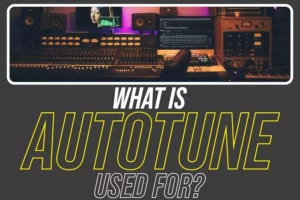
If you’re reading this article, then there’s a good chance that you are not familiar with the term “autotune.” You might have heard it in passing or seen it on social media without really understanding what it is.
When it comes to music, autotune is all the rage. But how exactly does this computerized voice-correction software work? We’ll explain here what makes this application so popular, and let you know whether or not you should consider using it on your next big project.
What Is Autotune?
Autotune is a form of pitch correction software. It automatically corrects the pitch in voices or solo instruments, which are out of tune. The most common use for autotune is to make all vocals perfectly on-key by using an algorithm that detects incorrect pitches and adjusts them with either an equalizer or digital vibratoless effect.
Autotune was created in 1997 by Antares Audio Technology, a company that makes professional audio processors for music studios and sound engineers. There are different types of autotunes used depending on the application required–from subtle correction to special effects.
It is used in all types of music, from rap and hip-hop to pop and rock songs. There are also many other uses for autotune outside of recording studios–news anchors can use it on TV or even sound engineers during live performances at concerts. It is especially common in America, where it has become a standard part of most singers’ repertoires.
Autotune is a technology that uses an algorithm to detect the pitch of your voice. Based on what it detects, it will change or modify the way you sound as if someone else was singing for you. It can be a highly effective tool for many singers, but there are still several disadvantages to using it.
What Is Autotune Used For?
Autotune can be used to fix a singers voice, as well as allow the singer to use their own “voice” for musical instruments such as drums and guitars. It is also used to fix music that is off tempo and for adding effects such as reverb.
Here are some of the main reasons why musicians use autotune:
- For live performance. Autotune allows you to sing/play an instrument and sound exactly as if it were on a recording, so there is no need for backing tracks or prerecorded music. You can switch keys at any time! This works especially well for rappers.
- Autotune is a great learning tool. It makes difficult songs sound simple and helps you learn to sing in ways that would be hard otherwise.
- To make your voice sound more interesting, especially if you’re not a good singer. Autotune can do wonders to make your voice sound like a professional singer. It gives your voice an interesting tone which isn’t always easy to achieve naturally.
- To hide true vocal mistakes and problems to create an overall better performance and more pleasing final product. Autotune can be used to remove mistakes in an otherwise great track.
- Autotune is very useful for rappers who need their lyrics to come across as clearly as possible when rapping at breakneck speed. They don’t want to be distracted by a misheard lyric or missed beat. Autotune makes it easy for them to go back and change any words that need changing without changing the way they rap, which can make their lyrics sound unnatural.
- For recording vocal harmonies. This is a huge one among many music producers since autotune allows you to record multiple vocals on top of each other, which can create a beautiful harmony.
- To fix vocal problems after you’ve recorded them. If there are any mistakes, autotune allows you to go back and remove or correct them easily without having an entire take ruined.
- To come up with interesting new sounds. To create a more radio-friendly sound (for example, to make the voice stand out in amongst music that is heavy on bass).
- Producers use autotune to avoid having to hire an expensive studio musician instead of using their own “voice” for instruments.
- And finally, it’s useful for creating interesting effects that might not be possible in a natural setting.
Things You Should Think About Before Deciding Whether Or Not To Use Autotune On Your Next Track:
It can be difficult to get used to using autotune at first. You have to keep practising with it to get better at using it. If you are just starting out, it might be better to avoid autotune until your skills improve. Remember that most listeners can tell when a voice has been autotuned. Therefore, it is good practice to make sure the purpose of using it is clear in some way (for example, by ensuring you include another vocal performance with no effects).
You also need to decide whether or not to share your track with other people while it is still in its autotuned state. Some believe that the artist should be honest and open about how a track was produced, even if that means sharing an unfinished version of their work. On the other hand, some think it is important to keep an air of mystique about their music and so would never share a track until after removing any autotune effects.
Depending on what you use your song for (for example: uploading to Soundcloud or sending out demos), you might want to consider whether it is necessary to share your track with other people before you remove any autotune effects.
The choice is yours, and there are arguments for both options, but the most important thing when deciding whether or not to use autotune on a song that you want others to hear is communication; be open about what you’re doing and why.
Disadvantages Of Using Autotune
One of the first problems is that autotune has become so popularized within pop culture. People have become accustomed to hearing this effect used all over mainstream music videos on the radio, and they often times expect everyone who is singing to have used it.
Suppose you are not using autotune in your music. In that case, people may consider the quality of your music or vocals as being inferior compared to someone who is recording with autotune. The average listener might assume that if they can’t hear any voice modification on a song, there must be something wrong with the singer’s voice or recording.
Another problem is that many musicians allow themselves to get too reliant on autotune, and in some cases, depend on it for most of their songs. If you constantly rely on technology to make your vocals sound good and smooth out any bad notes, listeners may think that there isn’t enough passion in your songs.
Another issue with autotune is that it can drastically change how you sing or play your music, making all of your performances sound unnatural and robotic. Do not let yourself become reliant on technology to make up for poor vocals or performance skills–only use autotune if you are having difficulty sounding good without it.
The Controversy Surrounding Autotune
Autotune is a pitch correction software that makes it easy for singers with the most unpolished voices to sound like they have perfect pitch. Autotuning is not just used in music but also in television and film production as well. Popular artists such as Cher and T-Pain use autotune when making their songs and videos. While autotune makes it easy for singers to get songs out quickly, many people debate whether the music industry should use this technology.
Many critics argue that by making its use widespread in pop and hip-hop music, producers have made a mockery of the craftsmanship involved in songwriting and instrumental performance. Other critics say it is a legitimate and effective tool, just like pitch correction software in other fields.
Those who support the use of autotune say that anyone who doesn’t have perfect pitch can still make music, and they also argue that the human voice is not meant to be perfectly in tune. Additionally, even if singers use autotune when live performing or recording their songs in-studio, this does not mean they aren’t talented musicians. It just means that they are taking advantage of modern technology.
The controversy surrounding the use of autotune will continue to be debated for years to come as it quickly becomes more widespread across different forms of media. Although the debate may continue, autotune is here to stay.
Conclusion
Autotune is software that can be used to alter the pitch of an audio recording. It was originally developed by Antares Audio Technologies in 1996 and has been heavily used since 2001 when producers started using it to correct off-key vocals in songs.
There are many reasons musicians use autotune, but most agree that it is mainly due to live performances or vocalists with limited singing abilities who want perfect sound quality recordings on their albums. People dislike autotune because they think it makes singers sound robotic and unnatural; however, there’s no denying the popularity of this technology among music listeners today.


